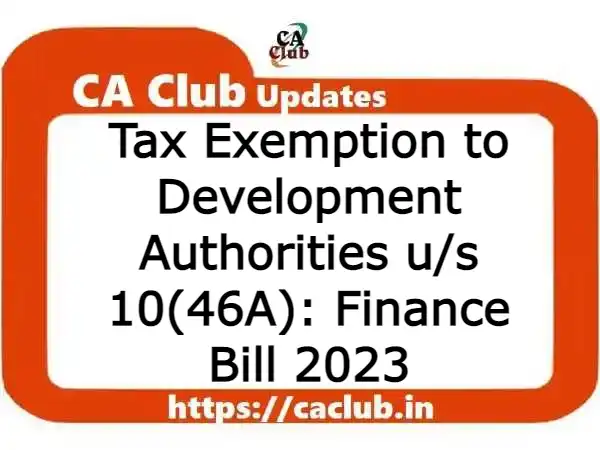Finance Bill 2023 proposes to insert a new Section 10(46A) to exempt the income of a body or development authority, such as a board, trust, or commission (not a company), that provides public utility services and to exclude their income from the purview of Section 10(46) of the Income Tax Act.
So, clauses 5 and 7 of the Finance Bill 2023 propose to change sections 10(46), 11(7), and the nineteenth proviso in the explanation of section 10(23C), and to add a new section 10(46A) to the Income Tax Act.
1. Section 10(46) of the Income Tax Act exempts certain incomes of development authorities, such as a local body or authority, a board, trust, or commission, or a group of such bodies or authorities, which,
(a) was created or established by or under a central, state, or provincial act, or was created or established by the central government or a state government to regulate or run a public activity;
(b) is not engaged in any business activity; and
(c) the Central Government notifies in the Official Gazette for the purposes of Section 10(46).
2. The fact that anyone or any authority (board, trust, or commission) notified under Section 10(46) can’t do business has caused a lot of debate.
3. In the case of ACIT (Exemptions) vs. Ahmedabad Urban Development Authority (Civil Appeal No. 21762 of 2017), the Hon’ble Supreme Court of India held in its order dated October 19, 2022 that the term “commercial” for the purposes of Section 10(46)(b) has the same meaning as “trade, commerce, business” in Section 2(15) of the Income Tax Act. So, the amounts charged by a notified body, authority, board, trust, or commission (no matter what they are called) will need to be looked at in the same way, i.e. whether they are close to cost with a small markup or much higher, to see if they are “commercial activity.”
4. However, the Hon’ble Court has made a clear distinction when it comes to statutory authorities, boards, etc. that were set up by the state or central government to do “public functions” or “services.”
The court has held in such cases that the amounts or any money whatsoever charged for public services are prima facie to be excluded from the mischief of business or commercial receipts because their objects are essential for the advancement of public purposes or functions.
5. In light of the foregoing, it is proposed in the Finance Bill 2023 to amend the Income Tax Act to exclude the income of a body, authority, board, trust, or commission that is not a company from the scope of Section 10(46) of the Income Tax Act, and to insert a new clause (46A) in Section 10 to exempt their income.
6. The new Section 10(46A) proposes to exempt any income derived by a body or authority, board, trust, or commission, other than a company, established or constituted by or under a central or state act for one or more of the following purposes:
i) addressing and meeting the need for housing accommodations;
(ii) city, town, or village planning, development, or improvement;
(iii) regulating, or regulating and developing, any activity for the general public’s benefit; or
(iv) regulating anything that has to do with the reason it was made for the good of the general public.
7. For the purposes of this new Section 10(46A), the Central Government must also notify such a body or authority, such as a board, trust, or commission, in the Official Gazette.
8. Accordingly, consequential amendments are proposed in Section 11(7) and the nineteenth proviso in the explanation to Section 10(23C) of the Income Tax Act.
9. These amendments will take effect on April 1, 2024, and will apply to assessment years 2024–25 and onwards.
Related Posts:

Is Indian Red Cross Society eligible for exemption under section 10(46A) of the Act?
Which form is required to be filled for getting deduction under section 10(46A) of the Income Tax Act?